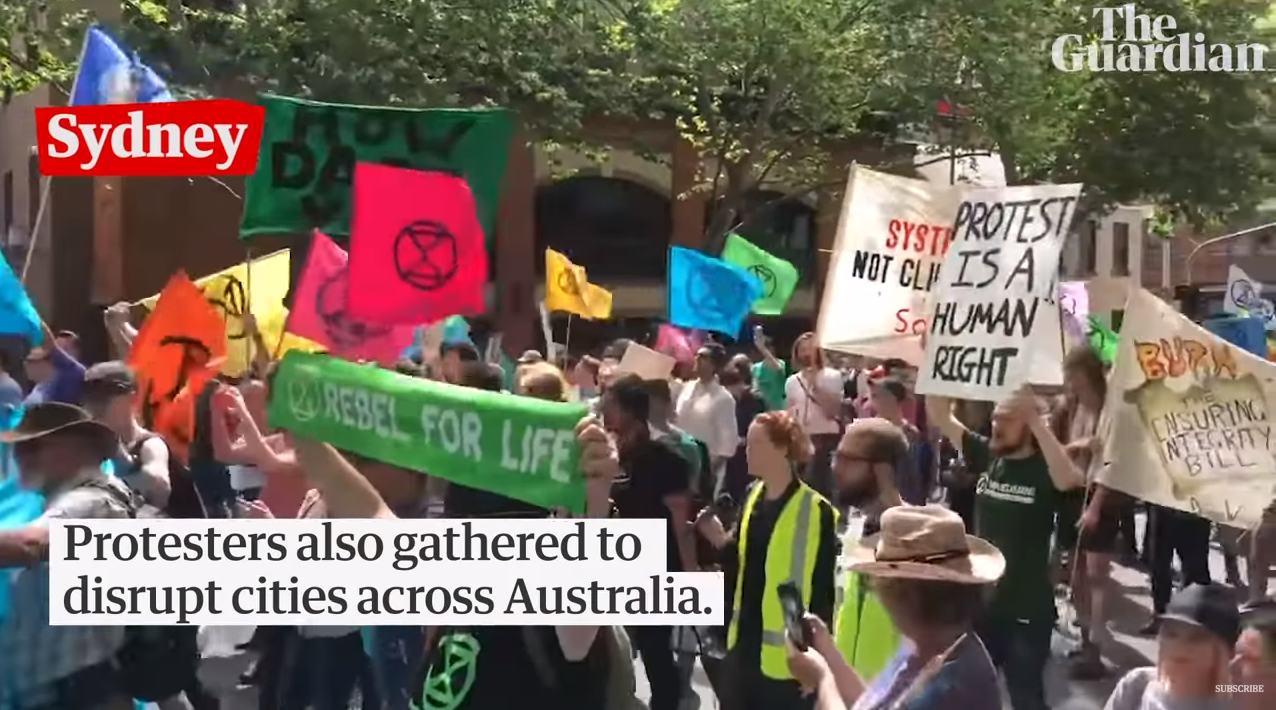 New York Times Australian bureau chief Damien Cave joined with Livia Albeck-Ripka to defend the disruptive activists who make up the Extinction Rebellion climate cult, who disrupt people going about their way in an attempt to get arrested, to help save the earth, or something.
New York Times Australian bureau chief Damien Cave joined with Livia Albeck-Ripka to defend the disruptive activists who make up the Extinction Rebellion climate cult, who disrupt people going about their way in an attempt to get arrested, to help save the earth, or something.
The piece with this long title “Why Is Australia Trying to Shut Down Climate Activism? -- An increasingly outraged public is demanding action in a nation intimately linked to coal mining. The government has responded by threatening a new law to punish protesters” began:
One climate activist halted train service by chaining himself to the tracks. Others have glued themselves to busy roads, causing gridlock. And just last week, protesters locked arms to stop people from entering a mining conference before being forcibly dispersed by police officers with pepper spray.
Cave approved of all those tactics disrupting the lives of normal Australians (while skipping the obvious question, why target public transportion which is supposedly more environmentally friendly?). He saw the real problem as the conservative Australian government attempting to put it to a stop (click “expand”):
A surge of climate activism is flooding Australia as the country falls behind on its promise to reduce emissions -- effectively ignoring the Paris Agreement the Trump administration just abandoned. Prime Minister Scott Morrison has responded with a threat that’s alarmed scientists and free speech advocates, arguing that the government should outlaw “indulgent and selfish” efforts by environmental groups to rattle businesses with rallies and boycotts.
Australia’s “climate wars,” once confined to election campaigns, are now spilling into the streets with some of the biggest protests the country has ever seen. An increasingly outraged public is demanding action while the conservative national government refuses to budge, relying on the police to squelch dissent.
Cave was saddened by his adopted country’s atavistic lust for dirty, filthy coal:
Scientists strongly disagree [that coal is safe], warning that the world stands little chance of averting the most dire effects of climate change without ending its reliance on burning coal for energy. But Australia has an emotional and historical connection to it that continues to shape its politics.
The combustible rock was first mentioned in government records soon after British settlement. Now, Australia is the world’s largest coal exporter. It is also a major exporter of natural gas, making for a resource-driven country that is “rich, dumb and getting dumber,” according to one recent headline summarizing the findings of a Harvard study that ranked Australia’s economy 93rd in complexity, behind Kazakhstan, Uganda and Senegal.
One wonders how Kazakhstan, Uganda, and Senegal feel about being the butt of a joke in the name of hard-left environmental ideology.
He described the End Times-style radicals of Extinction Rebellion in carefully benign terms. The supposedly draconian proposals don't seem onerous to normal people (click “expand”):
Extinction Rebellion encourages activists to get arrested so they can use the courts as a platform to call for climate action.
(....)
Other countries have dealt with these tactics through persistent arrests. Over 10 days of protests in London, the police arrested more than 1,700 Extinction Rebellion protesters.
Australia aims to go further. A law passed last year allows the military to break up protests. The Labor government in Queensland is fast-tracking a law to add new fines for protesters who use locking devices to prevent their removal.
Under the loaded subhead “Exaggeration and ignorance,” Cave waved away concerns of radicalism (click “expand”):
As the climate conflict intensifies, activists and their opponents are fighting hard to win over public opinion -- often with misconceptions used to maximize alarm.
Take coal. Reduced coal mining would not hurt the economy as much as people think.
According to the Australia Institute poll from last month, Australians believe coal mining accounts for 12.5 percent of Australia’s economic output and employs 9.3 percent of its work force. “In reality,” the report says, “coal mining employs only 0.4 percent of workers in Australia and is 2.2 percent of Australia’s G.D.P.”
But Extinction Rebellion isn’t just targeting Australian coal, but all fossil-fuel industries; as well as cars and airplanes. Still, he insisted: “Portrayals of extreme activism are also exaggerated. The vast majority of protesters demanding climate action are not radical disrupters.”
He’s penned this same hysterically pitched, conservative-bashing climate change story several times before. In an August 2018 story, he whined, “with many on the right opposing anything the left supports – including well-established science – any mention of emissions control tends to create an anaphylactic reaction among Australian conservatives.”
Cave did not take the surprise victory of the Conservative Party in the May 2019 election well, writing a “news analysis” lamenting that voters didn’t care for the activist climate agenda of the left-leaning Labor Party: “It Was Supposed to Be Australia’s Climate Change Election. What Happened?”





